#david lam
Explore tagged Tumblr posts
Text

Thursday, May 30, 2024
"If everyone had the habit of paying dirty money, they'll think that going by the back door is a proper thing. They all belong to the corruption group. What's the use of anti-corruption?"
202. FIRST SHOT (David Lam, 1993) - Hong Kong - Physical - NYU Library, DVD - 100 minutes. New to me #184.
0 notes
Text
#falsettos#newsies#ride the cyclone#rtc#bare a pop opera#bapo#rocky horror picture show#rhps#hamilton#broadway#jack kelly x david jacobs#jack kelly#noel x mischa#ride the cyclone noel#mischa ride the cyclone#polls#musicals#lams#hamilton x laurens#marvin x whizzer#jason x peter
156 notes
·
View notes
Text














Sally Yeh in 鐵甲無敵瑪利亞 / I Love Maria (1988)
#sally yeh#鐵甲無敵瑪利亞#i love maria#1988#david chung#john shum#ben lam#80s movies#1980s film#hong kong action#sci fi#comedy#robot#android#armor#actor posts
2 notes
·
View notes
Text
Volume 281



0:00:00 — "God of Grace" by Unknown Artist (1994)
0:05:06 — "More Love, More Power" by Unknown Artist (1994)
0:09:31 — DJ
0:15:19 — "Safe Harbor" by Richard Souther (1989)
0:20:39 — "Nightseasons" by Richard Souther (1985)
0:24:50 — "Dream Suite" by Richard Souther (1985)
0:27:29 — "Line Upon Line" by Richard Souther (1986)
0:30:56 — DJ
0:36:20 — "Alone" by Rhythm of Creation (1995)
0:39:40 — "Only God Knows" by Symbiotica (1997)
0:43:15 — "Sand Starr" by Mortal (1995)
0:44:07 — DJ
0:48:30 — "My Brother's Keeper" by Casino (1993)
0:52:15 — "Interlude in B Minor" (Instrumental) by David Meece (1989)
0:53:09 — "Devotion" by Monastery (1998)
0:58:08 — "Tannin Dance" by Kerry Livgren (1989)
1:01:34 — DJ
1:06:59 — "O' Come All Ye Faithful" by Jeffrey Lams & John Andrew Schreiner (1986)
1:11:09 — "Love, Love / Sing Hallelujah" by Jeffrey Lams & John Andrew Schreiner (1986)
1:15:30 — "How Great Thou Art" by Jeffrey Lams & John Andrew Schreiner (1986)
1:20:40 — DJ
1:25:57 — "Lyn" by Koinonia (1989)
1:28:41 — "Love" by Ambient Theology (1995)
Stream
Download
#unknown artist#richard souther#rhythm of creation#symbiotica#mortal#casino#david meece#monastery#kerry livgren#jeffrey lams#john andrew schreiner#koinonia#ambient theology
2 notes
·
View notes
Text
10 anni di baobab experience + elenco di appuntamenti (a partire da oggi) + lettera al governo sul caso almasri
Ricevo e molto volentieri rilancio la più recente newsletter di Baobab Experience: Sono passati 10 anni dallo sgombero di Ponte Mammolo che ha dato inizio all’esperienza di Baobab Experience. E visto che 10 è un gran bel numero, ci sembrava il caso di festeggiarlo. Sarà un anno all’insegna della restituzione alla collettività di tutto quello che abbiamo imparato sul campo: con eventi, dibattiti,…

View On WordPress
#Almasri#Andrea Costa#Baobab#Baobab Esperience#centri di detenzione#conferenza stampa#Corte penale internazionale#David Yambo#diritti umani#giustizia#Lam Magok#Lam Magok Biel Ruei#Libia#Mahamat Daoud#migranti#migrazioni#Mitiga#Montecitorio#Osama Najim &039;Al Masri&039; Habish#Refugees in Libya#Resistenza#rimpatrio#tortura
0 notes
Note
What are your thoughts on your friendly neighborhood spider-man?
I'm probably not going to watch it. Like, it looks fine, it's just that I know the Peter characterization is going to annoy me beyond reason so I'm not putting myself through that. I think the choices surrounding the Osborns are interesting -- I've previously talked about how I think there's an interesting interpretation of Norman and Harry as either Black or Jewish, because those are basically the only ethnic groups where the famous "Osborn hair" curl pattern shows up, but that with Norman in particular you need to balance it on Peter's side by admitting some things canonically, which I don't see YFNSM doing. But I do like the decision and I think Norman's role in it seems interesting. It's just Peter where I'm like I'm not doing this to myself. It's always just Peter.
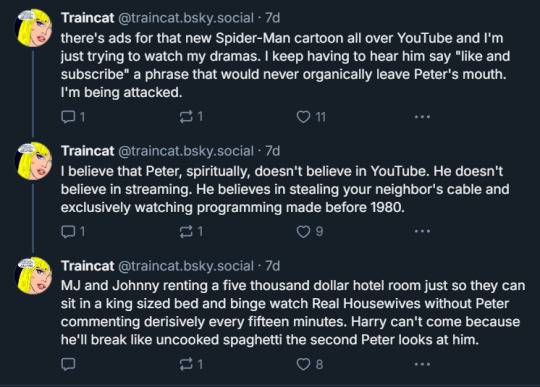
I'm standing by these comments. I was just trying to watch gay tomb raiding nonsense and I was assaulted.
But I'm trying to do this thing where I'm not endlessly bitter about recent Spider-Man so instead I'm going to rec Friendly Neighborhood Spider-Man (2005) (NOT 2019 that was a disaster) (you want Peter David you don't want Tom Taylor) as a comic because I think it does some really fun stuff.
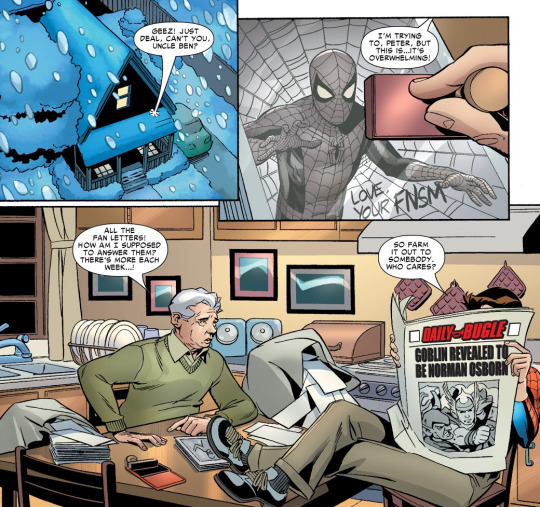
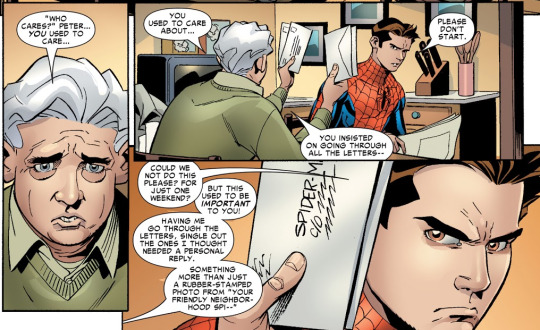
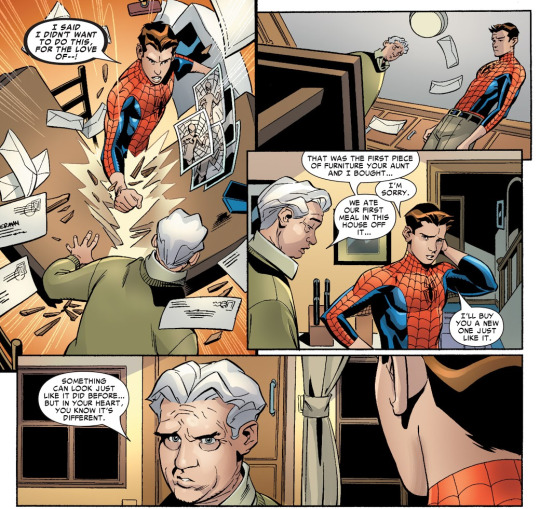
Really interesting arc looking at what would happen with Peter if May had died instead of Ben! Really exploring May's influence on Peter and how she's the person who made him as good and kind as he is! (Friendly Neighborhood Spider-Man #8)
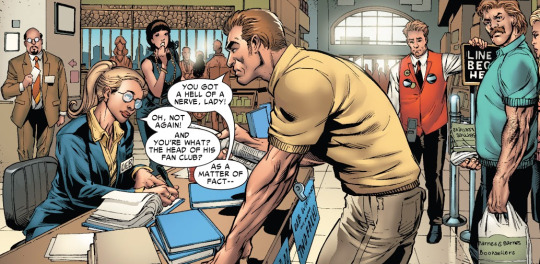
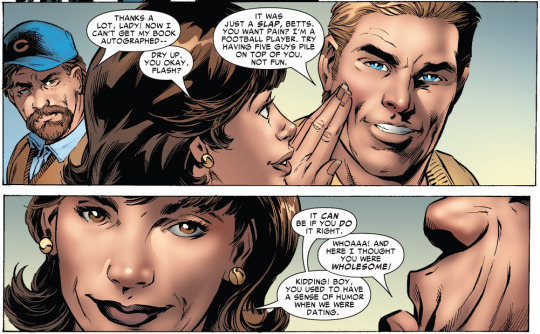
Interesting fallout from Civil War! The revenge of Deb Whitman, the woman Peter drove to a mental breakdown just by being himself! Flash defending Peter! That's his man! Betty is here! (Friendly Neighborhood Spider-Man #16)
"I thought you were wholesome!" okay gay boy.
Also note Flash's clothes -- they're the same clothes Peter is wearing at the start of Back in Black, which means he was crashing at Flash's place when he was on the lam after switching sides in Civil War. I love them.

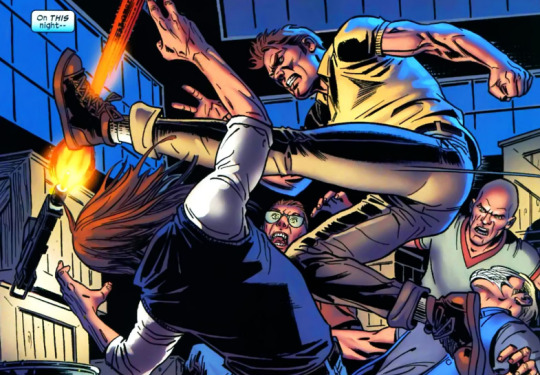
The cuffs are even rolled up on the pants! Peter's either 5'10" or 6' even depending on what canon source you trust, and Flash was 6'2" before he lost his legs, so that's a fun detail with the pants. (ASM #539)
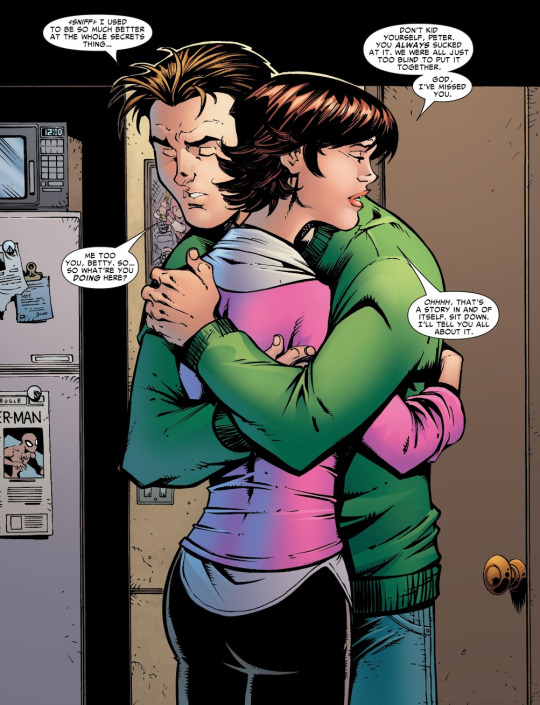
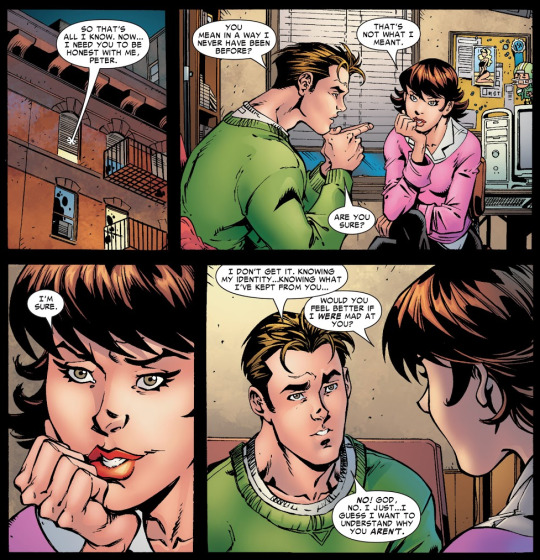
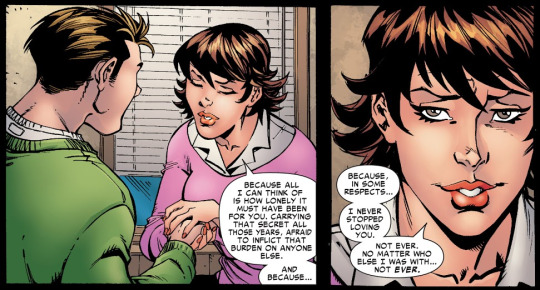
Peter and Betty being freaks about each other! Betty getting to know, even if only just for a bit, that Peter is Spider-Man! She never stopped loving him, not ever, no matter who else she was with! Not ever! Freaks! (Friendly Neighborhood Spider-Man#20)
Also an otherworldly spider monster tries to lay eggs in Flash. Because that's a thing that happens.
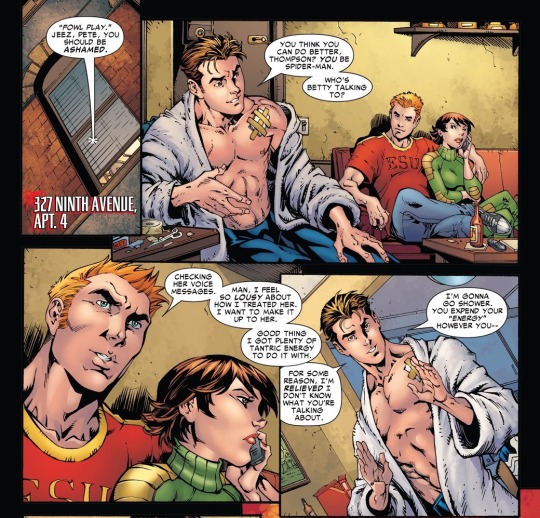
Why are the three of them like this. (Friendly Neighborhood Spider-Man #22)
I have my issues with Peter David but he is a very solid Spider-Man writer and there's some really good fallout from Peter's Civil War identity reveal here. Jonah gets to punch him in the face and it's deserved.
54 notes
·
View notes
Text
DOCTOR WHO SERIES 14: A FULL SEASON REVIEW
Another decade, another frantic Doctor Who resuscitation. (Not that there were news of potential cancellation, but things must’ve been dire for the BBC to sell one of their most storied shows to the Mouse.) Chibnall is out, Moffat on retainer, Russell “Thee” Davies is in. The theme song is the best since Matt Smith, which, through weird and inexplicable coincidence, was also the last time I watched Who with any serious interest. Good start.
The Star Beast

While not technically part of the season, the specials preceding series 14 signal the beginning of a shift in tone and rules for Doctor Who, including the introduction of the new Doctor. Not yet, though. First we get an OLD DOCTOR FUCK YES DAVID TENNANT IS BACK.
I already know Tennant won’t stick around, and I’m glad. That would’ve stunk of Disney nostalgia-raking. Nevertheless, as a returning viewer, I’m grateful for the breakfall. “The Star Beast” doesn’t yet carry the magic that’ll characterize Gatwa’s series. It’s a standard scifi monster of the week serial, and the monster rules. Looking for returning companion Donna Noble, the Doctor runs into the Meep, a no-pronouns gremlin-Yoda puppet living in Donna’s shed, under the care of her daughter, Rose.
UNIT comes under attack by Kamen Riders. The Meep tears off the blorbo mask to reveal a genocidal dictator on the lam from the Intergalactic Criminal Court. It’s a hilarious turn in an episode whose emotional core relies on Rose’s transgenderedness. Pronouns are a real-time strategy game and evil space aliens are better at it than humans.
Quick dustup on weird plot shit: if Donna remembers the Doctor she dies. She has to remember anyway, in order to stop the Meep’s ship from taking off. Turns out that she’s since become immune to Time Lord neuron overload by offloading it on her daughter. Donna and Rose expel the toxic memories by harnessing their feminine emotional intelligence.
I don’t want it to land. Facing the Doctor, who was a woman one episode ago, Rose says that a man could never understand how she just harnessed the divine feminine. Nevertheless it passes, maybe because any representation of a transgender woman as through-and-through female is a gasp of fresh air. For better or worse, this also cues the season’s cardinal rule: what you feel is true is more important than what makes sense.
Wild Blue Yonder
The TARDIS crashlands at the edge of the universe and disappears when it senses danger, one of those things that it’s never done before and will only do again if it’s funny or cool.
The “edge of the universe” is a spaceship floating in ink-black, with Marvin the Paranoid Timebomb making its way down the hall, one step at a time. This is a great opportunity to ease us into the budgetful new Doctor Who, with sleek but understated shots of the spaceship’s exterior. When the Doctor and Donna split up to fix the ship, they converse with each other’s doppelgangers: “not-things” from beyond reality, looking to assimilate physics. Communication with the not-things goes awry as an eerie set of medium close-ups pull back to reveal their overlong limbs.
Backed with half a decade of set chemistry, Tennant and Catherine Tate ace all four characters in this bottle episode. Much of the runtime consists of the Doctor and Donna’s mind games against each other. It’s less a restatement and more a self-justifying exploration of why bother with a last hurrah for two fan favorites. Well-earned, too, as the Doctor nearly leaves the real Donna to die in the ship’s explosion. It’s impossible to be done exploring the fullness of a relationship. But one day, and soon, we will have to move on.
The Giggle
Two crucial stopgaps against the not-things. One, a line of salt on the floor, which the Doctor tricks them into thinking they can’t cross, since they’re sorta vampires. Two, cognitive dissonance. It’s hard enough for the uncreatures to assimilate beliefs, let alone simultaneous contradictory ideas.
The Doctor fears that, by invoking fiddly rules at the edge of reality, he’s opened a door for fell mythos. This episode stars the Toymaker, a villain from a partially restored First Doctor serial. Originally a Fu Manchu caricature, the new Toymaker is Neil Patrick Harris putting on a German accent, which he can always do, it’s never racist.

The Toymaker has snuck a mind-warping signal into every screen, starting with the 1925 Stookie Bill experiment. Now mankind is mad , reacting with explosive hostility at any confrontation. Over the last decade, as writers have moved from mocking subsets of people for being on phone to everyone being on phone, we’ve uncovered more cohesive portrayals of what 24/7 connection is doing to us. Writ large, more and more of us are looking to win arguments. Even losing is a thrill.
It’s a contrived plan for a villain whose power transcends mere limitless control over physical matter. The only thing that binds the Toymaker is the rules of the game. We can trace the evolution of TV drama by comparing his first appearance to his last, William Hartnell’s almost congenial gotchas to Tennant’s panic at genuine omnipotence. The Toymaker traps the Doctor and Donna in a theater for a puppet play about the many deaths of the former’s companions. The Doctor, ever the hero, denies them three times.
Well, are they dead? These specials have proven that, even in the megacorp mines, fan favorite returns don’t have to be Rise of Skywalker gruel. Donna, and the Fourth Doctor’s returning Mel Bush, bring necessary continuity to the transition into new-new Who.
Not everything, at least, has to end in tragedy. When the Toymaker commandeers the giant laser gun the government is cool with UNIT keeping in uptown London, the Doctor bigenerates, splitting into straight Tennant (presumably) and gay Ncuti Gatwa. Together they beat the Toymaker at catch, which banishes him for good.
From here on, we follow Gatwa’s Doctor. Tennant stays with Donna. There is movement in rest, organic, within. Their relationship may continue to develop, just where we can’t see it. Not everything is for screen consumption.
The Church On Ruby Road
Every time I see this episode’s title I get Hüsker Dü’s “Girl Who Lives On Heaven Hill” stuck in my head, except the Inter Arma cover because that’s the first time I heard that. The Doctor is fortunate enough to run into one of the few actresses that can match his energy, Millie Gibson as Ruby Sunday: songwriter, orphan and ingenue. Ruby lives a zoomer kitsch apartment with string lights on the walls, alongside her adoptive mother and grandmother. She suffers from a curse of bad luck, bewitched by an airshipful of baby-eating goblins.
The Doctor and Ruby stop the goblins from eating a baby, to the tune of an R&B paean to Jabba-the-Hut, the only logical step from the Toymaker’s Spice Girls lipsync sequence. The goblins retaliate by traveling in time to eat baby Ruby, abandoned by her mother on Christmas day on the porch of The Church That Lives On Ruby Road. Watching Ruby’s mother go, Gatwa cries his series-first tear of silent grief. He’s very good at that.
The Doctor’s rule of no self-interaction has fucked his opportunity to let Ruby meet her biological mother. Pay attention, this’ll be on the test. Other than that, “The Church” is an easy, fun, low-stakes introduction to the Doctor’s companion and many of the season’s dominos, only some of which will receive a proper knockdown.
Space Babies
The first real ostentatious show of Disney budget is a quick but lush visit to James Cameron's Mesozoic. A CGI diplodocus doesn’t have to be bad. CGI baby mouths, on the other hand.
Budget cuts strand a colony spaceship, replete with babies in a bizarre state of semi-suspended animation: they’ve been toddlers for six years. Only accountant Jocelyn remains. The babies are terrorized by the Boogeyman, a snot monster generated by glitched-out educational software. Jocelyn almost airlocks the Boogeyman until the Doctor reminds her that it’s kind of her baby also.
The Doctor’s memory of Ruby Road changes to feature Ruby’s mother pointing at him. It starts snowing indoors, another magic plot puzzle piece. Cue tear of silent grief. There’s not much else to say about “Space Babies”. It’s a lot of terrible ideas, executed with functional neatness: quoting a friend, the platonic ideal of a Russell T 6/10.
The Devil’s Chord
1925 again! There’s a whole pantheon of Toymaker-type evil gods. This one’s Maestro, the god of music, played by a spectacular Jinkx Monsoon. Over the course of four decades, Maestro ruins music so thoroughly that even Abbey Road sounds like dogwater.
The Doctor and Ruby negotiate with the Beatles, who make dodgy gestures towards the whole of music being an embarrassing business. It’s never made clear how Maestro has convinced the world of this, or, like the Toymaker’s giggle, why they bothered when they have the power to eat music itself. We’ve crossed into the realm of magic. It’s not about the method, but the goal: within a hundred years, musicless mankind will self-exterminate to vent its anger, leaving Maestro to enjoy pure aeolian tones.
It’s hard to agree that music is the salve keeping mankind from abject violence when contending with the history of, Burzum, Chris Brown or Meni Mamtera. Nor does the idea that Maestro can be defeated by a seven-note scale available to basic Western music theory hold much water. “The Devil’s Chord” is an altogether less cohesive “The Giggle”, and only three episodes after its predecessor, too. On the other hand, as a piece of musical cinema, it’s a brilliant watch for Monsoon’s performance, the playful metanarrative gestures, and the closing number, ‘There’s Always A Twist At The End’.
Boom
On the ravaged planet of Kastarion-3, there is only war. A landmine vaporizes a guy, attracting an 'ambulance' automaton to euthanize his friend Vater by reducing him into an awesomely gross flesh tube.
Gatwa leaves the TARDIS in a super-sexy leather jacket and steps on a mine. What follows is ten agonizing minutes of the Doctor and Ruby figuring out the logistics of the situation. The Doctor can’t move off the smart mine or exhibit high emotion. On finding Vater’s tube, Ruby convinces the Doctor to let her hand it to him to use as a counterweight, in a move that almost kills them both. The pressure is immense, achieved with nothing but close-ups to tears of silent grief and a silly prop of a landmine with LEDs.
Vater’s daughter finds the duo, triggering the flesh tube to generate a grief counselor hologram of her father. Ruby gets shot while managing a haywire ambulance. The only way to get the ambulance to treat her is to admit that the Kastarians never existed. With a full third of characters dead, Cyber-Vater betrays its parent corporation to end the war. This is the most stressful Doctor Who gets, in all the best ways. For a second, and against all logic, I was even convinced it might be the end of Ruby Sunday.
“Boom” is the closest Gatwa’s Doctor has to a companion capsule episode. This focus on their relationship might’ve gone over even better if it’d been earlier in the run, especially given “The Devil’s Chord” has the opposite problem. I suspect the prime reason why it’s placed in an awkward middle slot is to not give away the game: “Boom” front-and-centers Susan Twist, who’s played minor roles in almost every episode since “Wild Blue Yonder”, as the face of the combat ambulance AI. There’s always a twist at the end, remember?
73 Yards
The Doctor’s always stepping on some bullshit. After intruding on a ritual circle, he disappears, leaving Ruby alone with a mysterious woman that’s always standing 73 yards away. Everyone who talks to the woman flies goes no-contact with Ruby: a hiker, a bar-goer, UNIT, even, in a harrowing turn, Ruby’s adoptive mother. So Ruby spends the next twenty years alone. Without her family, and also alone in this ethereal way where she’s meant to be on startlit adventures, not half-there on a wine bar date.
Gibson carries this mammoth episode on her shoulders, evolving from panicked 20 year old to middle-aged, purpose-driven mercenary. The closest thing to a co-star is the cinematography, following her eyes towards the woman-shaped hole in the near horizon. This is one of the subtler metanarrative moments of the season: the woman is impossible to photograph, blurry in pictures just as she’s never in focus for the camera.

Ruby makes up a mission: save the world from ‘Mad Jack’ Roger ap Gwilliam, a presidential candidate whom the Doctor off-hand warned would lead the world to nuclear ruin. Infiltrating, Jack’s presidential campaign, she maneuvers the woman into manifesting next to him, which makes him run screaming from office. The world is saved. Ruby isn’t. As she lays dying of old age, alone, the mystery woman is revealed to be herself, traveling back in time to warn the Doctor off the circle.
This is the furthest Doctor Who can stray from its own standards before becoming a different show altogether. The theme song doesn’t even play (shame). Not a coincidence, it’s also the episode to most demand that we trust emotion over logic, and it pays back that trust with dividends. It doesn’t matter that we never find out why there was a shrine to Mad Jack atop a cliff in Wales twenty years before his time, or the mechanism by which Ruby created a closed time loop. The important bit is the emotional resonance, the click of catharsis when we discover just enough details to let it rest.
Dot and Bubble
I feared, as “Dot” opened on a woman so dependent on social media that she can’t navigate her immediate surroundings without GPS, that this would be the Phone Bad episode “The Giggle” had managed to surpass. The truth is more complex: Finetime’s residents can afford to spend all day Whatsapping because they’re the offspring of another planet’s leisure class, here on permanent vacation.
Giant man-eating slugs have invaded Finetime, and the Dot-Bubble navigation system is walking people straight into their maws. Our lead is neither Gatwa nor Gibson, but Callie Cooke as Lindy Pepper-Bean in yet another of the acting masterclasses that characterize this season. An ongoing tension point is whether Lindy can keep her Bubble down long enough to string together two tasks. This means the season’s highest ratio of close-ups to other shots. Cooke carries this focus with recidivist disdain, processing the situation in arbitrary bursts only to default to anger at the Doctor for intruding on her groupchat, or elation at meeting a celebrity singer.
The slugs are an invention of the Dot, which, after years of servicing Finetime, has learned hate. Huddled outside the habitat dome, the all-white survivors reject the Doctor’s 'dirty' safe passage, and strike out to colonize the wilderness, ‘like their ancestors’.
Laterally to Phone Bad, an ongoing trend in wronghead fiction is Rich Bad. Movies like Bodies Bodies Bodies portray the bourgeoise as a self-obsessed bunch who will fall snarling on themselves at the first provocation. This is not what makes the bourgeoise dangerous, but in fact the exact opposite: because the rich have everything to lose, they will close ranks against you, no matter how much good you’ve done for them, no matter what you could yet do.

Rogue
Before the season ends, anybody want to defend England one last time? Playing nobility at a Regency London ball, the Doctor runs into Rogue, a bounty hunter who mistakes him (at gunpoint) for a shapeshifting, murderous Chuldur.
The Chuldur are fans of Bridgerton, on Earth to cosplay it to death. In order to lure them out, The Doctor and Rogue publicize their whirlwind romance. If “Dot and Bubble” was a response to the idea that Gatwa might run into racism if he travels to the past, “Rogue” is its inversion: the plan works because the modern Chuldur can’t resist the titillation of wearing a black gay man. They run after the hypervisible Doctor, while the white Rogue becomes “the other one”. He’s less problematized, less interesting, the one you get stuck with if you don’t call intersectional shotgun.
After the trap is sprung by accident, Rogue's banished alongside the Chuldur to a random dimension of nobody’s knowing. The Doctor declares it’s impossible to find him. We’ll see about that.
For all its nods towards fandom, “Rogue” isn’t a po-faced condemnation of fan culture. Ultimately, the Chuldur too are defeated through cosplay. Plus, it’s a straight beat-by-beat of the strongest points in Who structure: strong side characters, scifi logistics, a villain as goofy as it’s horrific. Whether its back-to-back placement with its thematic mirror, or as a segue to the season finale, is ideal, is anyone’s guess.
The Legend of Ruby Sunday
The Doctor asks for UNIT’s help in figuring out why Susan Twist follows him everywhere. On 2024 Earth, she’s Susan Triad, tech CEO on the verge of releasing some kind of Alexa thing. But before we get to that, the Doctor decides now’s the time to meet Ruby’s biomom.
Using a ‘Time Window’, Ruby visualizes The Church That Lives On Ruby Road. Ruby cries: the Window refuses to show her mother’s face. The machine goes all creepypasta on some UNIT boot. Panicked, the Doctor chases down Triad, who reveals she can remember her past lives in dreams.
Triad pulls away to her conference. Though she’s live worldwide, her soundstage is empty, the crowd canned. Where much of this season has dealt with the phenomenons of mass media and TV, “The Legend” digs into a grief specific to Doctor Who, an ill-kempt archive of decades forever on the verge of cancellation.
Little else happens, for two good reasons. First, this episode is a two-parter. Second, much of its runtime is dedicated to extracting maximum stress out of the situation. Ruby is too compromised to act, while the Doctor and UNIT are late from the start, only just figuring out the situation in time to witness it unfold. The big reveal paying off all this anxiety, crossed purposes, fear and despair is, unfortunately, a CGI dog with a hat.

Empire of Death
Sutekh is a Fourth Doctor villain who’s been locked in the Time Vortex for thousands of years or a dozen seasons, whichever’s longest. He has spawned harbingers like Triad in every planet that the Doctor’s visited, and his “dust of death” has the power to kill nost just everyone, but everyone at every point in time. In the era of streaming television (and stream-only television), the C-suite can overnight erase all evidence that a show ever existed.
Through a bit of absurd circular logic, the Doctor declares that the Time Window’s memory of a TARDIS is in fact a functioning TARDIS. The crew escapes to roam a deserted universe. The memory TARDIS begs to tie long-dangling plot strands into knots of neat logic. Instead, a bunch of nonsense dialogue happens. When Ruby asks the Doctor why Sutekh has a The Mummy thing going on, the Doctor answers “cultural appropriation”, and fails to elaborate. Laterally, when Ruby casually lists the chameleon circuit’s AOE as 73 yards, the Doctor asks how she knew that. She’s not sure. Nothing comes of this.
Because Sutekh is incapable of seeing Ruby’s mother, the Doctor decides it’s all tied together and heads to a government office in Mad Jack Britain, containing the UK’s forcibly harvested genetic data. Much more cohesive commentary on racism than reminding us cultural appropration is a thing Doctor Who has done. Armed with knowledge, the Doctor baits Sutekh into the Time Vortex, where he forces him to, like, kill death and then die in turn.
It’s a fantastic turn of character for the Doctor, who oft makes a spurious point of not killing in order to condemn villains to fates worse than death, or adopts a ‘War Doctor’ persona which kills a bunch of people anyway. It’s a matter of framing, but also a genuine point of no return. As for less satisfying character beats: Ruby gets to meet her mother, who’s just some middle-aged Instagrammer with a bad haircut and a passion for rocky beaches.
So why was this character immune to everyone from the Time Window to Sutekh, and the unwitting carrier of Ruby’s inherited power to make it snow? Because, the Doctor explains, we cared about her.
Which begs the question: who is we?
The easiest answer is: the last people left alive in the universe. But Ruby’s been making it snow since “Space Babies”. Not proximity to the Doctor either, else the Doctor himself would have magic powers: on the contrary, he’s spent the whole season grappling with his limited ratfic ability to deal with the supernatural. And there’s millions of orphans out there. Ruby is, in this regard as in most else, not special.
Taken all together along with the season’s metanarrative overtures, which keep going right up to the last second of “Empire”, the only answer is that we are the audience. Or the audience and the crew, anyhow: the camera, the screen, Ruby’s protagonism and the people that accept it. We have imbued Ruby Sunday with transcendental power, because we would like her to transcend.
This doesn’t work unless I am more emotionally than narratively invested in Ruby Sunday.
Not that I didn’t get torn up when Ruby met her mother. But that’s just cinema trickery. A season’s worth of promises, a bit of music, very good acting: of course I was going to care. Not more than I care about finding out what the fuck was going on, though. As an explanation, this all rounds out to: what was going on is what was going on. Ruby’s mom was important because she mattered to us, and it mattered to us because she was important. Me, I refuse to be complicit.
There is an unpleasant extreme to the logical lens, the CinemaSinners combing through scripts, sacrificing the greater story to the tendentious idol of Plot Holes. Doctor Who has long been plagued by these types, pitfalls of being an easy-watching BBC show with a large audience. Series 14 scans like a concerted effort to not give these guys an inch. In overcorrecting, it created a maudlin mess of unfulfilled promise.
That is as far as the season's connected plotline goes. Fortunately, most of the episodes are gems, directed with a sense of fun almost unseen in the revival series’ longstanding gloom. The Doctor has turned into a killer, maybe for good. We are promised that his tale will end in tragedy. I hold out hope that, next time the story tries to hit me where it hurts, it’ll follow through.
7/10
55 notes
·
View notes
Text


Mujer con alma de mariposa 🦋 Buenas Noches...

No guardes rencor contra todos los que te han hecho daño, perdonalos y mantente confiada en el Señor, porque el escucha tu clamor y ah prometido hacer justicia a los agravíados...
Deseo pasen una noche tranquila, tengán un sueño reparador y un hermoso amanecer...
Tú has visto el mal que me han hecho, Señor, sé mi juez y hazme justicia...
(Lam 3:59)...

Hazme justicia, oh Dios, y defiende mi causa contra una nación impía; líbrame del hombre engañoso e injusto...
(Salmos 43:1)...
El Salmo 143:1 dice: Señor, escucha mi oración, atiende a mi clamor; por tu fidelidad y tu justicia ven a socorrerme...

El Salmo 143 es un salmo de David en el que expresa su angustia ante una situación difícil...
En este salmo, David le pide a Dios que le haga justicia y que no lo juzgue por sus errores y que lo guíe para hacer su voluntad...
Tu no eres perfecta, pero tienes un Dios que si lo es, por eso no temás, hacercarte a el y pedirle que te ayude a ser mejor persona y que te defienda de todo aquel que te ah hecho mal sin ninguna razón...

Amén...DTBM.!!🙌🌺🍃😴💤💫
22 notes
·
View notes
Text

Scorpion
Introduced and built by the Terran Hegemony in 2570 before the technological renaissance that saw a more open view of quadruped 'Mechs, the Scorpion is an example of an idea that was ahead of its time. The Scorpion was the dreamchild of Dr. David Harrison. The 'Mech was originally intended as a stable weapons platform, but as the model came into service it was relegated to an infantry support role. The design itself was shunned by most MechWarriors due to the rough ride of the four-legged gait, but if the design is looked at through an objective standpoint the Scorpion is a very capable 'Mech for its intended role.
At some point there had been an attempt to create a LAM version of the Scorpion, an unworkable project that was abandoned and quite literally buried in a bunker on Hesperus II. The long-forgotten blueprints and prototype remains were found by chance in 3065. Although the Scorpion LAM project as such had been unsuccessful, it had succeeded in streamlining components and redesigning the leg suspension, and applying these modifications alleviated the famously bumpy ride on the -12S and all subsequent variants.
The quadruped Scorpion is built on a Brigadier 800F chassis and powered by a VOX 330 fusion engine, allowing it to move at a top speed of 97.2 km/h, which lets the 'Mech reach good firing positions quickly if pilots can endure the bumpy ride. Protection is provided by seven tons of 4/Star Slab standard armor, and heat is managed by 10 single heat sinks.
The Scorpion carries a very basic, though dangerous, weapons payload. Its primary weapon is an Anderson Armaments PPC which, when combined with the Scorpion's highly stable chassis, makes the 'Mech ideal for close support. For close range combat, the Scorpion carries a Marvel Six-Load SRM-6 which allows the Scorpion to capitalize on any breaches in the enemy's armor. The Scorpion has another, smaller swivel-mount looking tube beneath the cockpit, perhaps intended for a flamer, machine gun, or small laser, but this mount does not actually work and is purely cosmetic; speculation is that it was dropped after the frame was completed and removing it would have slowed down production.
15 notes
·
View notes
Text
Mortal Kombat fancast(new)
Simu Liu as Liu Kang

Glenn Powell as Johnny Cage
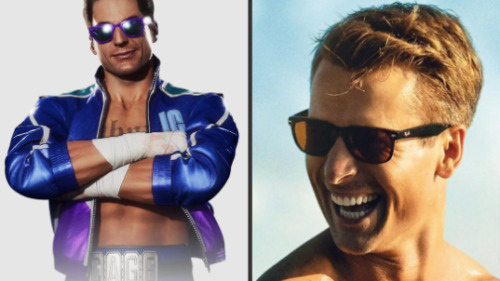
Charlize Theron as Sonya Blade

Ken Watanabe as Raiden
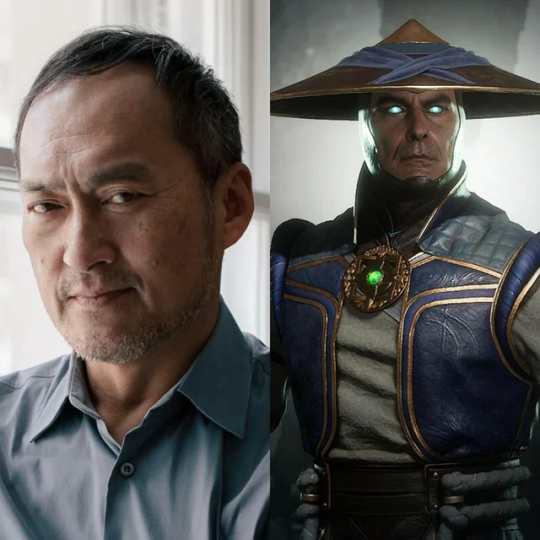
Henry Golding as Sub-Zero/Noob Saibot/Bi-Han

Andrew Koji as Scorpion
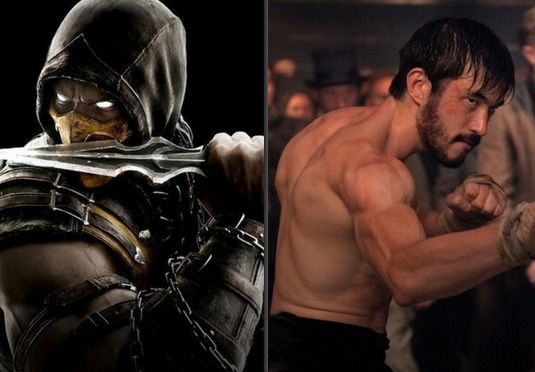
Manu Benett as Kano

Rory McCann as Goro

Cary-Hiroyuki Tagawa as SHang Tsung(Old, WHO ELSE???)
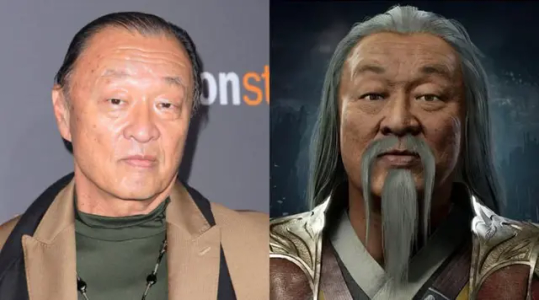
Tony Leung as Shang Tsung(Young)

Bill Skarsgard as Reptile

Iko Uwais as Kung Lao

Aldis Hodge as Jackson "Jax" Briggs
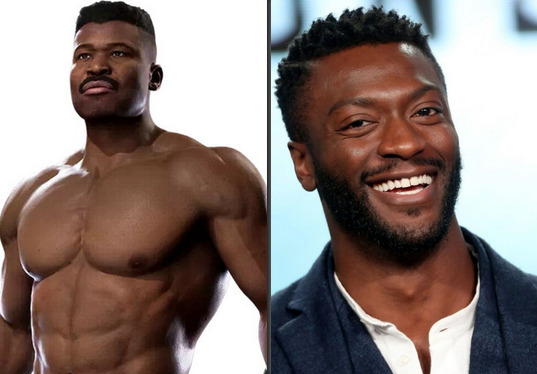
Elodie Yung as Kitana/Milenena


Zoe Saldana as Jade
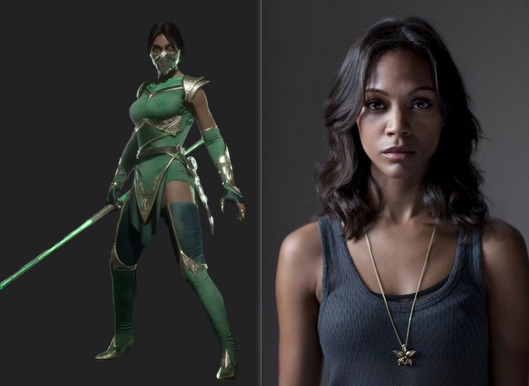
Harry Shum Jr. as Sub-Zero/Kuai-Liang

Justin H. Min as Smoke

Brian Tee as Sektor
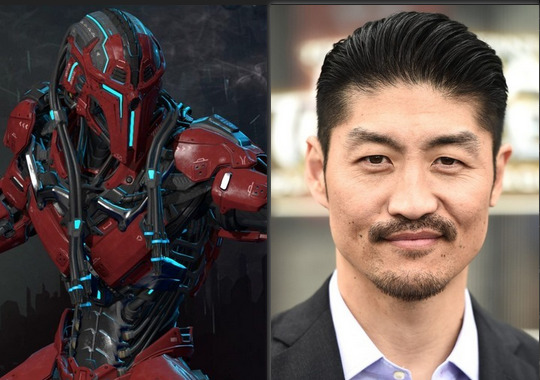
Chiwetel Ejiofor as Cyrax
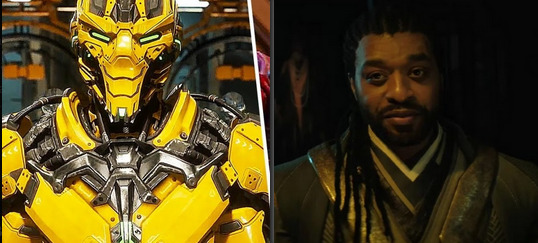
Scott Adkins as Baraka

Conan Stevens as Kintaro
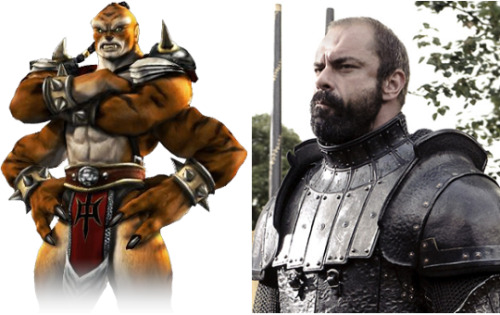
Dave Bautista as Shao Kahn

Eugene Brave Rock as Nightwolf
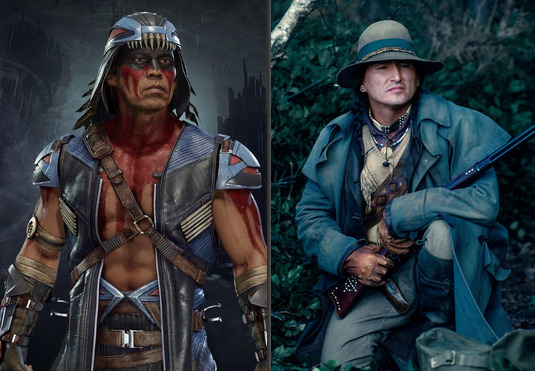
John Cena as Stryker

Jon Bernthal as Kabal

Michelle Yeoh as Sindel
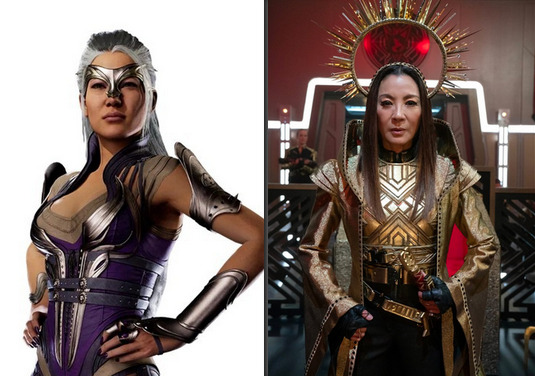
Jade Cargill as Sheeva

Nathan Jones as Motaro
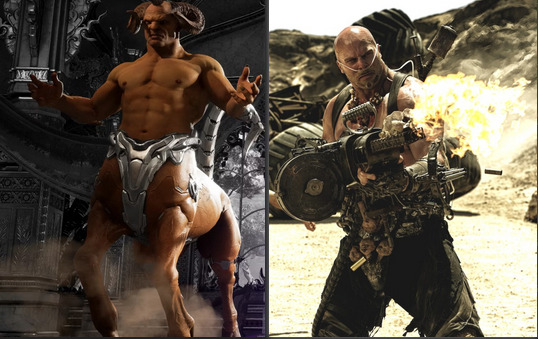
Doug Jones as Ermac
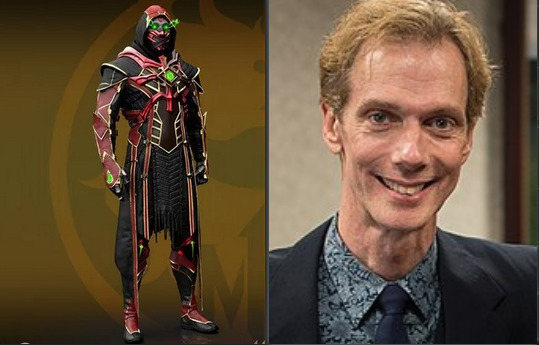
Because of Tumblr's stupid 30 picture limit, I cannot add more pictures, so here’s the rest.
Larry Lam as Rain
Jonathan Patrick Foo as Chameleon
Karen Fukuhara as Khameleon
Jet Li as Fujin
Sonoya Mizuno as Sareena
Brenda Song as Kia
Javicia Leslie as Jataaka
Anna Diop as Tanya
Jai Courtney as Jarek
Karl Urban as Reiko
Mads Mikkelsen as Shinnok
Hoon Lee as Quan Chi
Benedict Wong as Bo Rai Cho
Lewis Tan as Kenshi
Yvonne Chapman as Li Mei
Emma Myers as Frost
Peter Mensah as Drahmin
Derek Mears as Moloch
Charles Melton as Mavado
Ron Yuan as Hsu Hao
Alexandra Daddario as Nitara
Gordon Liu as Shujinko
Constance Wu as Ashrah
Donnie Yen as Hotaru
Daniel Wu as Dairou
Mahershala Ali as Darrius
Matt Smith as Havik
Dominic Sherwood as Kobra
Kristen Stewart as Kira
Keith David as Onaga
Ian McKellen as Argus
Eva Green as Delia
Tom Hardy as Taven
Mark Strong as Daegon
Ron Pearlman as Blaze
Jessica Henwick as Skarlet
Milly Alcock as Cassie Cage
Delainey Hayles as Jacqui Briggs
Mackenyu as Takeda Takahashi
Ludi Lin as Kung Jin
Winston Duke as Kotal Kahn
Tao Okamoto as D’Vorah
Jensen Ackles as Erron Black
Dafne Keen and Hafþór Júlíus Björnsson as Ferra/Torr
Tony Jaa as Tremor
Adewale Akinnuoye-Agbaje as Geras
Emily Blunt as Cetrion
Tilda Swinton as Kronika
#Mortal Kombat#Fancasts#Liu Kang#Johnny Cage#Sonya Blade#Raiden#Sub Zero#Bi Han#Kuai Liang#Scorpion#Hanzo Hasashi#Kano#Goro#Shang Tsung#Reptile#Kung Lao#Jax Briggs#Kitana#Mileena#Jade#Smoke#Sektor#Cyrax#Baraka#Kintaro#Shao Kahn#Nightwolf#Stryker#Curtis Stryker#Kabal
25 notes
·
View notes
Text
ok i PROMISE that this is my last redesign of ronnie
@magebunkshelf sorry for tagging you lmao
~Ronnie~

so ive changed a couple things about her!
Her last name! Originally it was Anderson, but in the latest vampire hunter audio, David was referred with the last name Anderson, and that just felt weird!
I don’t think I’ve posted this but Ronnie has some Cantonese decent! So, with that in mind, her new last name is, drum roll please, Lam!
She got a haircut between parts 3 and 4! I really enjoy giving my ocs their own personal lives outside of their main plots, and plus, she just looks a tad more badass with shorter hair!
Surprisingly not that traumatised? Like yeah obviously being turned is gonna alter your brain chemistry a bit but other than that she’s pretty normal mentally!
On the taller side! About 6’1!
that’s all for now! i need a nap holy shit-
#mage bunkshelf#still gonna put her under the ronnie anderson tag though#ronnie anderson#vampire oc#oc redesign#oc ref#idontevenknow7878
10 notes
·
View notes
Note
hi!! i know this has beeb asked before but not for a while and I thought there might be some releases since then, so : any Queer High Fantasy? I've been recommended Priory of the Orange Tree before. Thank you!!
Not sure when the last time was but here’s what’s currently on my radar! (You can also find these here, and an asterisk means it’s not out yet: https://lgbtqreads.com/sff/spec-fic-by-subgenre/) I bolded some of the ones that are newer or coming out in the next few months.
MG
*Splinter & Ash by Marieke Nijkamp – NB
Sir Callie by Esme Symes-Smith – NB
YA
Female Protags
The Winter Duke by Claire Eliza Bartlett
The Never Tilting World by Rin Chupeco – L
Queen of Coin and Whispers by Helen Corcoran
Of Fire and Stars by Audrey Coulthurst – L,B
Inkmistress by Audrey Coulthurst – B
The Impostor Queen by Sarah Fine – B
Noble Falling and Noble Persuasion by Sara Gaines
Rule by Ellen Goodlett
Havenfall by Sara Holland
*Hearts Forged in Dragon Fire by Erica Hollis
The Afterward by EK Johnston
Empirium by Claire Legrand – B
Belle Révolte by Linsey Miller – BA
These Feathered Flames by Alexandra Overy
The Midnight Lie by Marie Rutkoski
It Ends in Fire by Andrew Shvarts
Beneath the Citadel by Destiny Soria – B, A
The Third Daughter and The Second Son by Adrienne Tooley
Shatter the Sky by Rebecca Kim Wells – B
The Thousand Names by Django Wexler
Male Protags
Cloaked in Shadow by Ben Alderson
The Runebinder Chronicles by Alex R. Kahler
Skybound by Alex London
So This is Ever After by F.T. Lukens
Beneath the Citadel by Destiny Soria
The Sunbearer Trials by Aiden Thomas – T
Non-Binary Protags
Spell Bound by FT Lukens
Mask of Shadows by Linsey Miller – GF
*A Hundred Vicious Turns by Lee Paige O’Brien
Adult
Female Protags
A Broken Blade by Melissa Blair
Tales of Inthya by Effie Calvin
The Vanished Queen by Lisbeth Campbell
Rook & Rose by M.A. Carrick
The Night and its Moon by Piper CJ
The Unbroken by C.L. Clark
*Warmongers by C.L. Clark
The Gardener’s Hand by Felicia Davin
*The Water Outlaws by S.L. Huang
Dragonfall by L.R. Lam
The Unspoken Name by A.K. Larkwood
The Priory of the Orange Tree by Samantha Shannon
From Under the Mountain by C.M. Spivey
The Drowning Empire by Andrea Stewart (Amz)
The Jasmine Throne by Tasha Suri
Malice by Heather Walter
When Women Were Warriors series by Catherine M. Wilson
Male Protags
Kirith Kirin by Jim Grimsley
The Cadeleonian series by Ginn Hale
Tales From Verania by T.J. Klune
A Chorus of Dragons by Jenn Lyons
The Priory of the Orange Tree by Samantha Shannon
*Dark Moon, Shallow Sea by David R. Slayton
Stagsblood Trilogy by Gideon E. Wood
Genderqueer Protags
*The Water Outlaws by S.L. Huang
65 notes
·
View notes
Text





Bersatu Senada
https://youtu.be/ucMkBAXyj_4
This is another recording of one of our four performances at Chijmes (Singapore) on 02 September 2024 on the occasion of the Annual Voices Of Singapore Festival Celebration (singing 🎼Bersatu Senada🎶).
It was my debut performance as a bass singer in our choral singing group of 133 members (including my two sons, Darren singing Bass), David singing Tenor) - all together 133 singers, singing Soprano, Alto, Tenor & Bass).
Enjoy.
J. P. LEE
Presenting ….. …..
Song : Bersatu Senada
By Dr Tracy Wong
Conducted by Chong Wai Lun
Sung by Voices of Singapore Community Chorus
Pianist : Caleb Koa
Video recorded by Lam Jia Jin
We performed this at CHIJMES Hall on 02 Sep 2024 as part of the VOS Voices Festival.
Bersatu Senada is a fantastic piece that marries the folk sound of the Malaysian heritage with a modern choral sound. It means "Together with one voice", and tells of a journey into a foreign place but always keeping your cultural heritage alive.
#poetryportal#writerscreeds#smittenbypoetry#spilledwords#writingthestorm#poeticstories#inkstainsandheartbeats#writtenconsiderstions
13 notes
·
View notes
Text
emptyflowerpots -> jimothystu
'Twas time to embrace the hold this dumbass has on me :')
Tagging moots so y'all know who I am lmao. Tumblr will only let me tag so many, so I apologize for those I missed!
@donttelltheelff @graves-makar @jehbeeeh @peachesandghosts @make-me-imagine @tulowitzki @lam-ila @introvertedperson16 @lifeofpriya @thepassionthatunitesusall @david-reinbacher @kguhle @bojobichette @kevin-gausman @bumblebeebichette @frostysfrenzy @brook-luvs-bluejays @to-boldly-nope @matthewkniesys @kikuchi-redemption-szn @salty-backup-catcher @father-stlouis @emuchipmunk @softhockeyybros @jackhues @holyjost @cavan-biggio @may-the-puck-be-with-you @sirjaybobobka @drysdaales @chaoticgoodit @doctorbeverlycrusher @gordiemeow @lebretonflatsfacts @trippol-threat @somanyflippingbooks
36 notes
·
View notes
Note
Tlb question for you! How do you think the boys met/turned into vampires? 👀
Oh boy, this is gonna get a little Long, lmao.
So, a preface: when we talk about the Boys in pretty much any of our works relating to the canon, we're using these basic 'universe rules' - ie, this is going to be their backstory for anything we write, unless specifically stated otherwise, the rules of the worldbuilding of our universe is what we're assuming.
Also, sorry if I don't include details or it seems like I'm missing things? I hope I'm getting this across. All their backstories are complicated, and some things make more sense in the story, but if you have any other questions, feel free to ask!
Alright, that aside:
Also - realized that this. Never sent?? Sorry about that too. Here you go!
David Williams: Appearance: 19, Year of death: 1879.
David was the son of farmers and those settlers pushing into the northern Great Plains just after the American Civil War. David was living in what would become Colorado (which was then literally just the Colorado Territory) when his parents both pass, leaving him and his sister Rebecca, only a year younger than him, on their own. David, being no one from no where, with few skills other than how to farm, ranch, and train horses, as well as having fairly disruptive dyslexia, cannot provide for the two of them much. Rebecca gets married to a wealthier man looking for a wife and leaves, David and her promising they'll see each other by next Christmas, when David has some money saved. That is the last time David ever sees her.
Not long after the separation, David does indeed try to get the money...and gets desperate, losing most everything in the process, turning more and more to petty crime to get by, until he messes with the wrong gang and it comes to a head. They chase him, shoot at him (our David's left hand is actually quite fucked up from being shot through just before his turning.) David ducks into an alley to hide, and something decides that this human will do.
Max has been in America for a little bit, and despite it being touted as 'the great frontier', he's found it actually rather full of other vampires already. Max wants a brood, for his own future plans, and well, no time like the present, no place like the here and now. David was simply...convenient. Nothing special. Just a checkmark on Max's to-do list.
But he becomes so much more as the years go on, and David suffers for all his sire's 'love.' For some of what that looks like, read the drabble 'Whiteout'.
Dwayne: Appearance: 20, Year of death: 1900.
Dwayne, as you may have seen, has no last name. This is because Dwayne doesn't use the English surname that was forced upon him, and only used the English first name because he quite literally cannot remember his birth name. Dwayne was born to the Haida people of the island groups off the coast of what is now British Columbia Canada. He was taken from his family and sent to a residential school. Dwayne doesn't speak much of any part of this time of his life, though the scars, both physical and mental, remain to this day.
Dwayne too was somewhat on the lam when he was turned. Dwayne at the time was running people and goods places, usually outside of the law, across country borders, or with few questions asked. They paid him, and that's what mattered. He was then paid, one night, by a young man with strawberry blond hair and the palest eyes Dwayne thinks he's ever seen, to run him away from here. As far as Dwayne and the dollars he pays are willing to take him.
Dwayne does, because he never asks questions, and he tries to take the boy, whose name he learns is David, wherever he wants.
Long story short, because we ARE trying to save a little for the story lol, Dwayne is intercepted by Max, looking for his runaway Childe, and the rest is sorta unfortunately history. Dwayne to Max is...a punishment for David, ie 'look at how you cursed this one with your bad decisions' and also now something to hold over David's head. 'I gave you someone to keep you company, a friend, a brother, a broodmate, and I can take him away just as easily.'
Dwayne will always think that letting him live was Max's greatest mistake.
Jasper Kelly, ie, Thorn: Appearance: 19, Year of death: 1935.
This one gets a little fun, because we get to play around with a character who was only in the scripts, but we do turn into an incarnation of a movie character - Max's dog.
Jasper, ie Thorn as he prefers to call himself, is the son of people living in a Hoovertown in the Great Depression - which is to say, a fantastic hunting ground for vampires. Slight problem with this however: Thorn isn't a human.
Nope! See, here's where the fun worldbuilding stuff comes in. Berd and I decided that if vampires exist in this world, well, so too must other creatures, it's only fair. So - werewolves. I'll spare you our version of them, but long-story short, they can change at will, into full wolf shape, but Thorn can't. Thorn, as it turns out, is hit with like, the most recessive of recessive genes whammy, and he cannot shift! On top of that, he's an orphan, so all throughout his childhood, he kept getting shuffled from house to house, whoever would take him.
Thorn believes his ability to turn into a big blond-white 'dog', is just his special vampire power, and in a way he's right. But it's actually from the fact he was a non-shifting werewolf.
Paul Harris: Appearance: 19, Year of death: 1957.
Paul is a preacher's son, born in Massachusetts and having spent all 19 years of his living life there. Paul was raised a good son. An obedient son. A dutiful servant of God and his father. Paul is the oldest child and only boy out of six other children. (Paul sometimes, when he's drunk and in his caustic moods, comments that 'if his mother hadn't nearly died pushing out the last one, the old man would never have climbed off her...')
For all that though, Paul's life was one of undiagnosed (it was the 50s) emotional and learning problems, and while he remains so, we headcanon it's likely Bipolor, or adhd with extreme mood swings, which wasn't helped with the Protestant upbringing and homelife.
Paul meets David, Dwayne, and Thorn when they roll into town under Max, who is there for his own business. David takes a shining to Paul not so unlike how he will in the future with Michael, the pair falling pretty damn fast and pretty damn hard. David can see Paul as something that wants to break out, knows the glorious creature that he could unleash, and Paul is desperate to break his own choking lead. 'The Taste of Butter' drabble here should give you a fair idea of what that looked like ;) Paul is murdered-but-it-didn't-stick by his own father, and kills the man for his first kill.
Paul is, however, not Max's Childe. He's David's. His first one, and the tension between David and Max is starting to pull..rather taught.
Marko Bianchi: Appearance: 18, Year of death: 1980
I know the fandom is split down the middle with Marko being the baby of the pack, and Marko being David's second in command and second oldest, but aaaa we chose this! Marko is a child of the 70s and 80s, and queerer than a 3 dollar bill to boot. His father died when he was younger, and his mother remained single and raised him through his teen years very well, though not without Trouble. As the child of first-generation immigrants, and again, deciding to be fairly open about his orientation, Marko was...targeted for a lot of stuff. He learned to bite before a strike, so to speak.
It comes to a head, however, when Marko discovers that as many unfortunate people in the Community did, he caught the virus. And it terrified him like nothing else in this world.
Cue the blonde stranger - Paul. Now, Paul at this point for Story Reasons, is on his own in San Jose, a town close to Santa Carla, and set his sights on Marko. He's drawn to him, and Paul goes with the whims of fate. Marko doesn't know who Paul is, or why he doesn't leave when Marko tells him what's up, or why he keep encouraging all of the worst tendencies in Marko, but he does.
A bad night, a bad fight some idiots picked with the pair (though trust me, there's a lot more to it than that), and Marko becomes Paul's Childe.
A little drabble associated with this is this one, where Marko is. Contemplating things.
Anyway,,,, sorry it's so long! As I said before, Berd and I are writing our Lost Boys masterfic YCCM, and these backstories will all be fully filled in with time, and likely make a bit more sense. Thank you for the ask, and if you have any more questions, just ask!
14 notes
·
View notes
Text
Commons Vote
On: Passenger Railway Services Bill (Public Ownership) Bill: Committee: Amendment 14
Ayes: 111 (95.5% Con, 4.5% DUP) Noes: 362 (97.0% Lab, 2.5% Ind, 0.6% SDLP) Absent: ~177
Day's business papers: 2024-9-3
Likely Referenced Bill: Passenger Railway Services (Public Ownership) Bill
Description: A Bill to make provision for passenger railway services to be provided by public sector companies instead of by means of franchises.
Originating house: Commons Current house: Commons Bill Stage: 3rd reading
Individual Votes:
Ayes
Conservative (106 votes)
Alan Mak Alberto Costa Alex Burghart Alicia Kearns Alison Griffiths Andrew Bowie Andrew Murrison Andrew Rosindell Andrew Snowden Aphra Brandreth Ashley Fox Ben Obese-Jecty Ben Spencer Bernard Jenkin Blake Stephenson Bob Blackman Bradley Thomas Caroline Dinenage Caroline Johnson Charlie Dewhirst Chris Philp Claire Coutinho Damian Hinds Danny Kruger David Davis David Mundell David Reed David Simmonds Desmond Swayne Edward Argar Edward Leigh Gagan Mohindra Gareth Bacon Gareth Davies Gavin Williamson Geoffrey Cox George Freeman Greg Smith Gregory Stafford Harriet Cross Harriett Baldwin Helen Whately Iain Duncan Smith Jack Rankin James Cartlidge James Cleverly James Wild Jeremy Hunt Jeremy Wright Jerome Mayhew Jesse Norman Joe Robertson John Cooper John Glen John Hayes John Lamont John Whittingdale Joy Morrissey Julia Lopez Julian Lewis Karen Bradley Katie Lam Kemi Badenoch Kevin Hollinrake Kieran Mullan Kit Malthouse Laura Trott Lewis Cocking Lincoln Jopp Louie French Mark Francois Mark Garnier Mark Pritchard Martin Vickers Matt Vickers Mel Stride Mike Wood Mims Davies Neil Hudson Neil O'Brien Neil Shastri-Hurst Nick Timothy Nigel Huddleston Oliver Dowden Patrick Spencer Peter Bedford Peter Fortune Priti Patel Rebecca Harris Rebecca Paul Rebecca Smith Richard Fuller Richard Holden Robbie Moore Robert Jenrick Saqib Bhatti Sarah Bool Shivani Raja Simon Hoare Steve Barclay Stuart Anderson Stuart Andrew Suella Braverman Tom Tugendhat Victoria Atkins Wendy Morton
Democratic Unionist Party (5 votes)
Carla Lockhart Gavin Robinson Gregory Campbell Jim Shannon Sammy Wilson
Noes
Labour (351 votes)
Abena Oppong-Asare Abtisam Mohamed Adam Jogee Adam Thompson Afzal Khan Al Carns Alan Campbell Alan Gemmell Alan Strickland Alex Baker Alex Ballinger Alex Barros-Curtis Alex Davies-Jones Alex Mayer Alex McIntyre Alex Norris Alex Sobel Alice Macdonald Alison Hume Alison McGovern Alistair Strathern Allison Gardner Amanda Hack Amanda Martin Andrew Cooper Andrew Gwynne Andrew Lewin Andrew Pakes Andrew Ranger Andrew Western Andy MacNae Andy McDonald Andy Slaughter Angela Eagle Anna Dixon Anna Gelderd Anna McMorrin Anna Turley Anneliese Dodds Anneliese Midgley Antonia Bance Ashley Dalton Baggy Shanker Bambos Charalambous Barry Gardiner Bayo Alaba Beccy Cooper Becky Gittins Ben Coleman Ben Goldsborough Bill Esterson Blair McDougall Brian Leishman Callum Anderson Calvin Bailey Carolyn Harris Cat Smith Catherine Atkinson Catherine Fookes Catherine McKinnell Catherine West Charlotte Nichols Chi Onwurah Chris Bloore Chris Curtis Chris Elmore Chris Evans Chris Hinchliff Chris Kane Chris McDonald Chris Murray Chris Vince Chris Ward Chris Webb Christian Wakeford Claire Hazelgrove Claire Hughes Clive Betts Clive Efford Clive Lewis Connor Naismith Connor Rand Damien Egan Dan Aldridge Dan Carden Dan Jarvis Dan Norris Dan Tomlinson Daniel Francis Danny Beales Darren Paffey Dave Robertson David Burton-Sampson David Pinto-Duschinsky David Smith David Taylor Dawn Butler Debbie Abrahams Deirdre Costigan Derek Twigg Diana Johnson Douglas Alexander Douglas McAllister Elaine Stewart Ellie Reeves Elsie Blundell Emily Darlington Emily Thornberry Emma Foody Emma Lewell-Buck Euan Stainbank Fabian Hamilton Fleur Anderson Florence Eshalomi Frank McNally Gareth Snell Gareth Thomas Gen Kitchen Gerald Jones Gill Furniss Gill German Gordon McKee Graeme Downie Graham Stringer Grahame Morris Gregor Poynton Gurinder Singh Josan Harpreet Uppal Heidi Alexander Helen Hayes Helena Dollimore Henry Tufnell Ian Lavery Ian Murray Imogen Walker Irene Campbell Jack Abbott Jacob Collier Jade Botterill Jake Richards James Asser James Frith James Naish Janet Daby Jayne Kirkham Jeevun Sandher Jeff Smith Jen Craft Jenny Riddell-Carpenter Jess Asato Jess Phillips Jessica Morden Jessica Toale Jim Dickson Jim McMahon Jo Platt Jo Stevens Jo White Joani Reid Jodie Gosling Joe Morris Joe Powell Johanna Baxter John Grady John Healey John Slinger John Whitby Jon Pearce Jon Trickett Jonathan Brash Jonathan Davies Jonathan Hinder Josh Dean Josh Fenton-Glynn Josh MacAlister Josh Newbury Julia Buckley Julie Minns Juliet Campbell Justin Madders Karin Smyth Karl Turner Kate Osamor Kate Osborne Katie White Katrina Murray Keir Mather Kerry McCarthy Kevin Bonavia Kim Johnson Kim Leadbeater Kirith Entwistle Kirsteen Sullivan Kirsty McNeill Laura Kyrke-Smith Lauren Edwards Lauren Sullivan Laurence Turner Lee Barron Lee Pitcher Leigh Ingham Lewis Atkinson Liam Byrne Liam Conlon Lilian Greenwood Lillian Jones Linsey Farnsworth Liz Kendall Liz Twist Lizzi Collinge Lloyd Hatton Lola McEvoy Louise Haigh Louise Jones Lucy Powell Lucy Rigby Luke Akehurst Luke Charters Luke Murphy Luke Myer Margaret Mullane Marie Tidball Mark Ferguson Mark Hendrick Mark Sewards Mark Tami Markus Campbell-Savours Marsha De Cordova Martin Rhodes Mary Glindon Mary Kelly Foy Matt Bishop Matt Rodda Matt Turmaine Matt Western Matthew Patrick Matthew Pennycook Maureen Burke Meg Hillier Melanie Onn Melanie Ward Miatta Fahnbulleh Michael Payne Michael Shanks Michael Wheeler Michelle Scrogham Michelle Welsh Mike Amesbury Mike Kane Mike Reader Mike Tapp Mohammad Yasin Nadia Whittome Natalie Fleet Natasha Irons Naushabah Khan Navendu Mishra Neil Coyle Neil Duncan-Jordan Nesil Caliskan Nia Griffith Nicholas Dakin Nick Smith Nick Thomas-Symonds Noah Law Oliver Ryan Olivia Bailey Olivia Blake Pam Cox Pamela Nash Pat McFadden Patricia Ferguson Patrick Hurley Paul Davies Paul Foster Paul Waugh Paula Barker Paulette Hamilton Perran Moon Peter Dowd Peter Kyle Peter Lamb Peter Swallow Phil Brickell Polly Billington Preet Kaur Gill Rachael Maskell Rachel Blake Rachel Hopkins Rachel Taylor Richard Baker Richard Quigley Rosie Duffield
Rupa Huq Ruth Cadbury Ruth Jones Sadik Al-Hassan Sally Jameson Sam Carling Sam Rushworth Samantha Dixon Samantha Niblett Sarah Champion Sarah Coombes Sarah Edwards Sarah Hall Sarah Jones Sarah Owen Sarah Sackman Satvir Kaur Scott Arthur Sean Woodcock Seema Malhotra Sharon Hodgson Shaun Davies Simon Lightwood Simon Opher Siobhain McDonagh Sojan Joseph Sonia Kumar Stella Creasy Stephanie Peacock Stephen Kinnock Stephen Timms Steve Race Steve Witherden Steve Yemm Sureena Brackenridge Tahir Ali Taiwo Owatemi Tanmanjeet Singh Dhesi Tim Roca Toby Perkins Tom Collins Tom Hayes Tom Rutland Tonia Antoniazzi Tony Vaughan Torcuil Crichton Torsten Bell Tracy Gilbert Tristan Osborne Uma Kumaran Valerie Vaz Vicky Foxcroft Warinder Juss Wes Streeting Will Stone Yasmin Qureshi Yuan Yang Zubir Ahmed
Independent (9 votes)
Apsana Begum Ayoub Khan Imran Hussain Jeremy Corbyn John McDonnell Rebecca Long Bailey Richard Burgon Shockat Adam Zarah Sultana
Social Democratic & Labour Party (2 votes)
Claire Hanna Colum Eastwood
3 notes
·
View notes